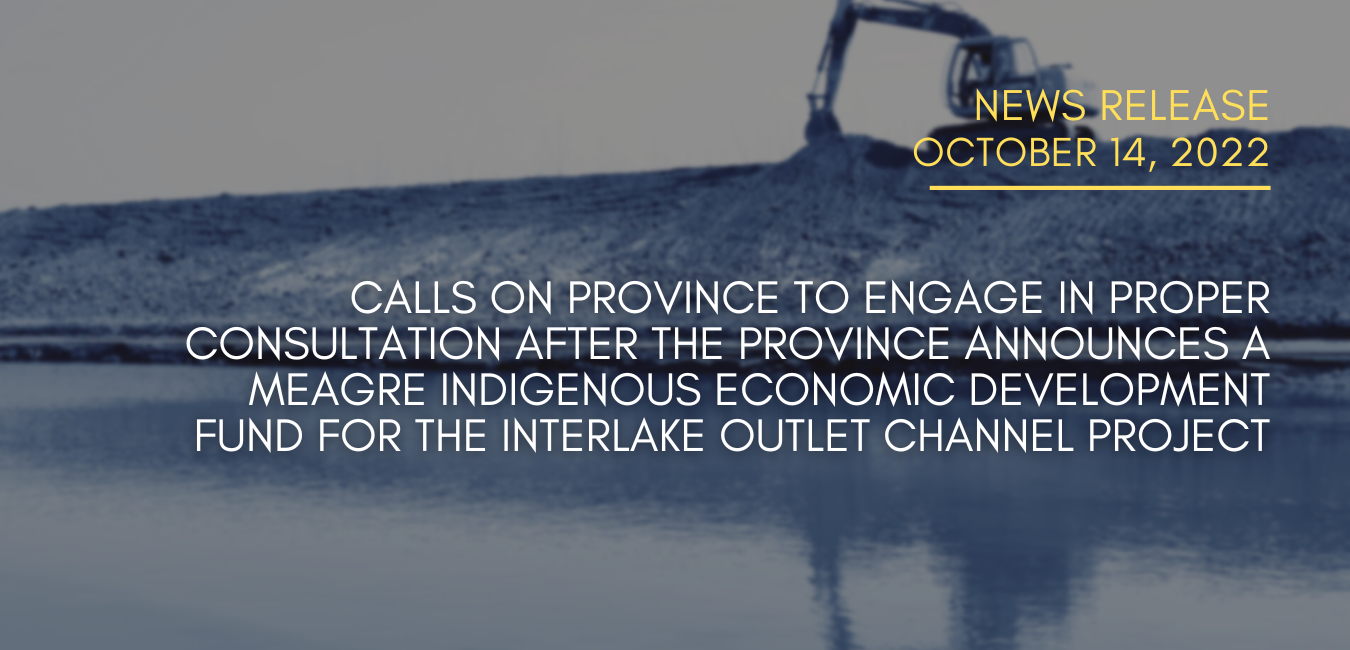The AMC Calls on Province to Engage in Proper Consultation After the Province Announces a Meagre Indigenous Economic Development Fund for the Interlake Outlet Channel Project

October 14, 2022
Treaty One Territory, Manitoba
alexpapineau
Treaty One Territory, Manitoba – The Assembly of Manitoba Chiefs (AMC) issued the following statement in response to an inadequate Indigenous Economic Development Fund announced by the Province for 39 communities affected by flooding in and around Lake Manitoba and Lake St. Martin.
The AMC stands with the First Nations leaders from the Interlake Reserves Tribal Council, who have voiced their disapproval and disappointment over the grossly inadequate Indigenous Economic Development Fund of $15 million announced on October 5th by the Provincial Government. The projected cost of the proposed Lake Manitoba and Lake St. Martin Outlet Channels Project is currently upwards of $600 million. The $15 million Indigenous Economic Development Fund would be accessible to 39 communities to assist with flooding recovery. If all eligible communities applied to this fund, each community would only receive $400,000, which is the cost of building a single house. This type of application for funding model also inevitably leaves less for the most affected First Nations. “We won’t be applying for this funding,” Deputy Grand Chief Cornell McLean said. “It is an insult and a contradiction to what was conveyed to us in initial meetings. This government benefits very richly from our resources on these lands and, once again, is not providing adequate support to First Nations. We came in expecting equal partnership, and we won’t have the Province dictating what crumbs we get.”
The Province and the Interlake First Nations leadership met this past summer to discuss the project, leaving the Interlake First Nations leadership with expectations of developing a flood protection partnership. Now it is clear that the Province has disregarded everything that they discussed in those initial consultation meetings. First Nations are most affected by environmental infrastructure projects, historically suffering the effects of inadequate engagement with changes to the traditional use of lands and resources, changes to the biophysical environment, and effects on fish and fish habitat, vegetation, and wildlife resources. AMC has outlined in specific detail what the steps for adequate engagement are, and it is disappointing that, once again, proper engagement did not happen.
Environmental regulators in Ottawa have raised concerns and questioned whether the Provincial Government has done enough to address nearby First Nations concerns. This concern was further supported by the Court of Queen’s Bench ruling last June that the Province did not live up to its constitutional duty to consult First Nations involved with the outlet channel project, a ruling which has delayed its approval. In 2019, the AMC proposed a work plan for a collaborative process of engagement with First Nations regarding the Lake Manitoba and Lake St. Martin Outlet Channels Project. In the work plan, AMC outlined that project-related engagement includes the Indigenous and Public Engagement Program (IPEP) for the Environmental Impact Statement (EIS) and Crown consultation processes.
“Again, we see that the Premier’s commitment to reconciliation is nothing more than a PR tagline to benefit their political agendas,” Deputy Grand Chief Cornell McLean said. “We call on the Premier and provincial officials to honour their duty to consult and to step forward and partner with us on a Nation-to-Nation basis. We know what we as First Nations need to protect our Nations, and as environmental stewards of these lands and waters.”